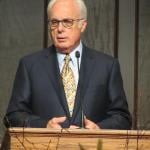And now for something completely different. In the penultimate chapter in this overly long book, Tom turns to Paul’s controversial and problematic relationships with his fellow Jews. This entails at the outset a discussion of Paul’s call/conversion. The chapter begins with an overstatement: “He did not see himself as establishing a new, non-Jewish movement. He believed that the message and life he proclaimed and inculcated was in some sense a fulfillment of all he had believed as a strict Pharisaic... Read more










